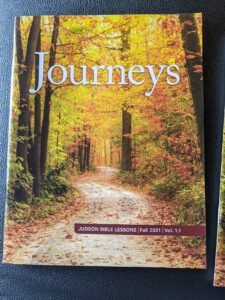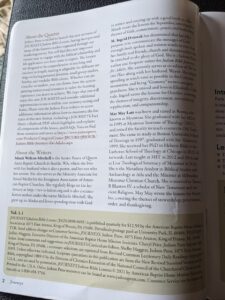Revised Common Lectionary: Zephaniah 3:14-20; Isaiah 12:2-6; Philippians 4:4-7; Luke 3:7-18
Narrative Lectionary: Word Accomplishes God’s Purpose, Isaiah 55:1-13 (John 4:13-14)
The prophet Zephaniah calls for a song of praise in 3:14-20. The prophet praised God and called the people to rejoice for what God would do for them, bringing them out of exile. God removed the judgment against them and turned their enemies away. God will gather the outcast and those who are disabled, who were prevented from participating in society, and change shame into praise. God will gather the people, bring them home, and they will be praised among the nations. What was taken from them will be restored.
Isaiah 12:2-6 is also a song of praise to God. Both the Zephaniah passage and Isaiah passage are similar to the psalms and can be considered psalms in themselves. Isaiah sings of God as the water of salvation, and the people are called to draw upon that water with joy. God is among the people, and they are called to sing praise and shout for joy.
Philippians 4:4-7 contains Paul’s exhortation to the church in Philippi to continue to rejoice and pray without ceasing. The church is not to worry but to know God is near, and to pray to God for their needs in thanksgiving. God’s peace is made known to them through Jesus, and will guard their hearts and minds.
Luke 3:7-18 continues from last week’s passage about John the Baptizer. In Luke’s account, people from all walks of life—even tax collectors and soldiers—come out to be baptized by John, but John warns everyone that this baptism must change their lives and their heart. He calls them a brood of vipers—snakes looking for an opportunity to strike and to play a social game rather than making the necessary changes in their lives. John warned them against claiming their ancestry as enough, because it doesn’t matter where one came from but how one lived their lives. So when asked, John gave some examples: share what you have with those who have nothing. Don’t take more than you need. For tax collectors and soldiers, he called upon them to do their job but not take advantage of others because of their position. John told the crowds that one was coming after him who was more powerful, like one with a winnowing fork on the threshing floor, separating wheat from chaff. Wheat and chaff grow together in the stalk, and the chaff must be removed. So it is when one transforms their life for God—what is useless must be removed.
The Narrative Lectionary focuses on the word that comes forth from God in Isaiah 55:1-13. God has sent forth the word, spoken to the people to call them into God’s ways. The prophet calls the people to listen to God’s word, to take that as food that satisfies and nourishes rather than what the world offers. Those who turn back to God will be forgiven. God’s word nourishes the world the way the rain and the snow does. In many of the psalms, the waters and mountains and trees praise God in creation, but in this passage, they celebrate the people, and their return from exile.
In John 4, Jesus encountered a Samaritan woman at a well, and spoke to her about himself as living water, a water that satisfies and nourishes. This water becomes a wellspring of eternal life.
On this third Sunday of Advent, known as Gaudete Sunday, we rejoice. Many of the scriptures for today focus on the theme of rejoicing at what God has done, rejoicing in God’s word and instruction, and rejoicing in God’s covenant. We also hear the word of John the Baptist, calling us into repentance and transformation. While “you brood of vipers” may not sound so joyful, it is the call into God’s ways, preparing ourselves for Christ that gives us joy. Shedding the ways we human beings often turn religion into social status and performance rather than transforming our hearts and lives. For the prophets remind us that when we turn back to God, there is rejoicing and forgiveness. New life can flourish in our hearts and in our world when we listen to the wisdom of God and find it in the commandments, in the rushing rivers, in the stories of our ancestors, and in the traditions of this season that remind us that God is still doing something new.
Call to Worship (from Isaiah 12:2, 5-6)
Surely God is our salvation.
We will trust and will not be afraid.
God is our strength and our might,
God has become our salvation.
Sing praise for God’s glory,
Let it be known in all the earth!
Shout aloud and sing for joy,
The Holy One is among us.
Prayer of Brokenness/Confession
God who called both John and Mary, You put words of revolution into their mouths. Mary rejoiced that You are changing the world; John called us to change our hearts and lives. We have failed to listen. We’ve paid attention for a season and then forgotten their challenge. We’ve turned back to the ways of this world, seeking wealth and worldly measures of success. We have forgotten the radical transformation that Mary sang of, and that John called us to pursue. Forgive us for paying lip service to Your covenant. Forgive us for failing to turn to Your ways. Forgive us for falling, once again, for the comforts and pleasures of this world while others suffer. Call us into repentance and true transformation. In the name of Christ, who continues to work in our hearts and lives, we pray. Amen.
Blessing/Assurance
The prophet Isaiah long ago declared that “with joy you will draw from the water of salvation.” The well runs deep, and whenever we turn back to God, we will find that the wellspring of life is everlasting and overflowing with God’s love for us. Rejoice! God is very near. Turn back to God’s ways, and may the peace of Christ be with you. Go and share the Good News.
Prayer
Eternally Rejoicing God, we rejoice with You! You created a beautiful, wondrous expanding universe, swirling galaxies, exploding stars, and You made us out of the dust of the stars. Like a magnificent painting, we emerged in the work, and You delight in us as Your children. In times of deep despair, in the murkiness of our world’s struggles, in the muck of daily life, may we remember You are still creating and rejoicing. Help us to laugh when we have forgotten how. Remind us to find pleasure in life when the world presses down. Guide us to seek help when in all seems futile, for You desire for us to rejoice. Help us to seek, find, and keep joy in our lives. Amen.


